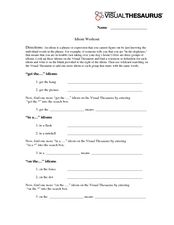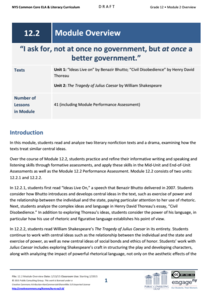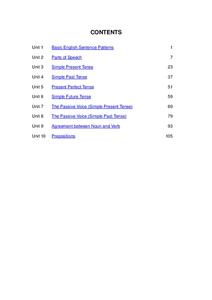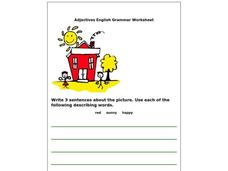Hump Software
The Writing Machine
Introduce your learners to the letters of the alphabet. They will tap to hear the name of each letter and see a word beginning with that letter appear on the screen. The highly repetitive nature of this app could be a good way to...
Curated OER
More Joy of Abstract Nouns 1
Students are provided with a list of 20 adjectives that they must generate abstract nouns to match. For example, the first term, luxurious, would prompt the answer luxury. Directions for this activity explain that abstract nouns don't...
Curated OER
Idiom Workout
Teach your students that identifying a phrase as an idiom isn't an insult! Providing an ample definition of the term "idiom," as well as three categories of popular idioms ("get the..." "in a..." and "on the..."), the activity prompts...
EngageNY
Grade 12 ELA Module 2
The second module in a series for high school seniors focuses on tracking the central idea of a text across genres and from multiple author and character perspectives. Twelfth graders read a speech by Benazir Bhutto entitled "Ideas Live...
C-SPAN
Should States Shift to Mail-In Voting during the Coronavirus Pandemic?
With the coronavirus pausing many norms in American society, officials are trying to decide how to safely hold voting in the 2020 presidential election. Using curated video clips, including speeches from Congress, journalists, and...
EngageNY
Grade 11 ELA Module 2: Unit 1, Lesson 19
Scholars look at paragraphs two and three in the "Atlanta Compromise" speech. They analyze how Washington uses a story about a ship lost at sea and rhetorical devices to develop his point of view. After class discussion and completing...
National Endowment for the Humanities
“From Time to Time”: Presidents and Communicating with the Public
While the Constitution requires a "State of the Union" address, it doesn't give many details. In fact, it wasn't until Woodrow Wilson that the periodic update to Congress was given in-person. Using primary sources, recordings and...
EngageNY
Grade 10 ELA Module 2: Unit 3, Lesson 3
What is in a word? Scholars look closely at the words from a speech by Eleanor Roosevelt. They analyze how she supports a claim without debate and without rejecting others. Learners use jigsaw discussion, guided questions, and respond to...
American Battlefield Trust
1861: The Country Goes to War
What was it like to know the Civil War was coming? Using a graphic timeline activity and excerpts of speeches from Abraham Lincoln and Jefferson Davis, learners consider the early days of the conflict. The resource includes prompts for...
Civil War Trust
Gettysburg Address
The Gettysburg Address may have been four score and seven years ago, but its message is still as relevant today. Young historians explore the context of the famous speech, as well as its central theme and argument, before discussing the...
EngageNY
Grade 10 ELA Module 2: Unit 1, Lesson 2
Help readers go deeper and gain an understanding of purpose and justification while analyzing a letter written by Martin Luther King, Jr. Literature lovers discuss the letter in a variety of settings, including in pairs, groups, and...
K12 Reader
Adjective to Adverb: Sentences
Could your young learners use some help with writing variety? Have them turn their adjectives into adverbs with a simple grammar exercise. Ten sentences prompt kids to find the adjective and rewrite the sentence to use an adverb instead.
North Carolina Consortium for Middle East Studies
The Importance of Holocaust Remembrance
Designed as the culminating activity after a unit study of the Holocaust, class members assume the voice of a world leader, write a speech, and participate in a simulation of the Stockholm International Forum on the Holocaust.
University of North Carolina
Remembering Martin Luther King, Jr.
After reading the article "Kings Dream Everyday," class members conduct a Socratic seminar discussion of Martin Luther King's contributions to the civil rights movement. They then read and respond to a passage from Michael Eric Dyson's...
Curated OER
Basic English Sentence Patterns
A simple set of practice sheets deals with sentence structure and patterns. The 117-page packet includes 10 units of skills, varying from identifying parts of speech in a sentence to writing the correct part to make a sentence...
Curated OER
Essay Evaluation
In this essay evaluation worksheet, young scholars are provided with a writing prompt and two sample essays. Students evaluate and grade the sample essays and provide three reasons why they graded as they did.
Curated OER
School Day
Students participate in a lesson that involves writing a persuasive essay. They use the prompt of "extending the school day". The paper should contain correct elements of sentence structure with clear purpose that is supported with...
Curated OER
How to Score in the Word Series
Students examine an object in the classroom and write a description of it employing exciting language. They brainstorm and outline ideas for an original article about an event they participated in or attended.
Curated OER
Adjectives English Grammar Worksheet
In this adjectives writing prompt worksheet, students examine a picture of a school scene and then use the space provided to write a story about the picture using the 3 adjectives provided.
Curated OER
Spring is in the Air: Yes/No Questions
By writing 5 sentences about spring, students practice creating yes and no questions. The prompts for the questions are difficult to follow. A teacher would have to give students explicit directions.
Curated OER
Preposition: In
For this preposition review worksheet, students practice printing the word in. Students also write 3 sentences using the word in and the 3 writing prompts.
Curated OER
Must Not vs. Don't Have to
In this grammar worksheet, students write fifteen complete sentences from a variety of prompts of things one must do and other things one does not have to do.
K12 Reader
Adverbs of Frequency II
Describe your daily activities with adverbs of frequency. Kids recall which things they seldom do, they rarely do, they frequently do, and the things that they never do.
Curated OER
Theater Lesson: Modify My Action
Young scholars engage in a lesson that is about the meaning of a verb or adverb. They perform sketches with the subject matter of the words. The goal is for the actors to show the meaning of the verb or adverb with an action.























